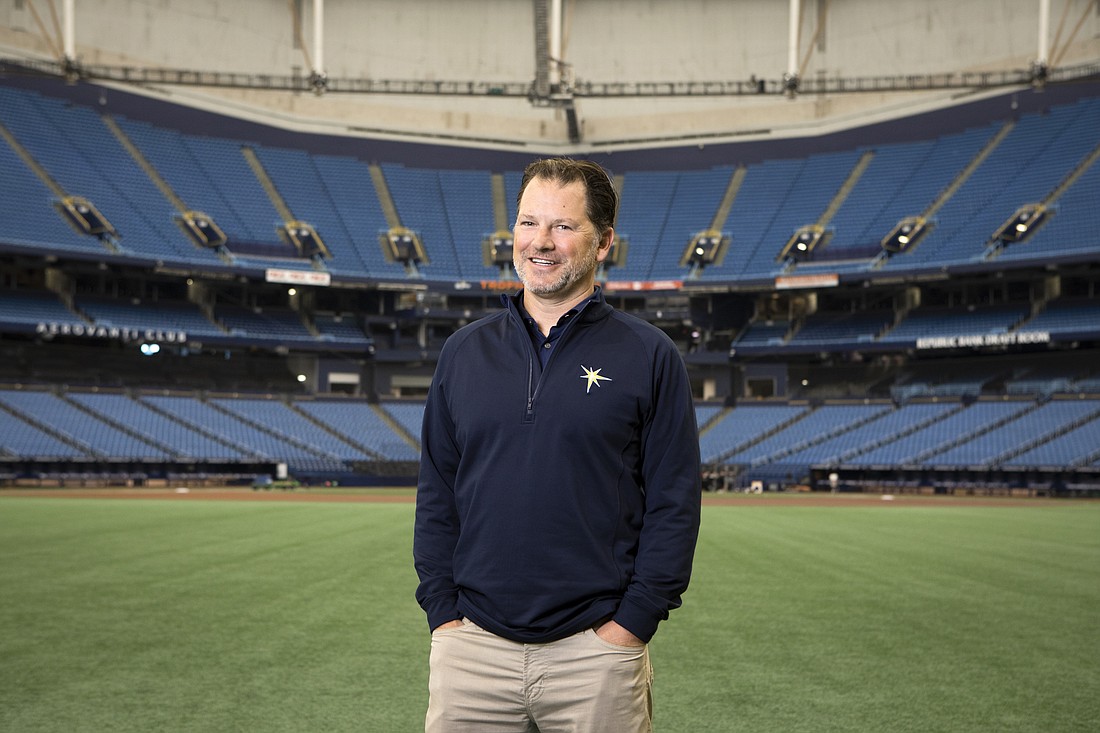- December 13, 2025
-
-
Loading

Loading

From defensive shifts to openers, the Tampa Bay Rays are the undisputed change agents of Major League Baseball.
With a lower budget to work with than most other clubs, the Rays’ front office creativity has helped the team punch well above its weight on the field: The Rays have made the playoffs five times over the past decade, including in 2020 when they advanced to the World Series but lost to the Los Angeles Dodgers. In the 2020s, the team’s winning percentage is a stellar .589, with a cost-per-win ratio that’s one of the best in baseball.
A big part of the Rays’ brain trust is Brian Auld, an 18-year veteran of the organization. The Stanford University and Harvard Business School graduate was named co-president, along with Matt Silverman, nine years ago. The duo filled the void left by Andrew Friedman, who departed in 2014 to become president of the Dodgers. In 2019, when the Rays bought the Tampa Bay Rowdies soccer franchise, Auld added another title to his business card: vice chairman of the Rowdies.
As opposed to many baseball “lifers,” in similar positions for other MLB teams, Auld started his career as an elementary school teacher and administrator. He joined the Rays in 2005 at the behest of Silverman, with whom he attended high school in Texas.
“While my colleagues were just getting started in the business world, when you have to be ‘on’ every single day and you’re responsible for 25 kids, you learn about planning, you learn about how to connect with people, no matter what,” Auld said in a 2019 interview with the Business Observer. “There’s something about trying to get an idea through to a 9-year-old that makes you realize that just yelling at them for not understanding is not going to be productive, so you have to try another route.”
Communication has been a double-edged sword for Auld. He’s been the public face of the Rays over the past few years as the organization’s quest for a new stadium has grown more urgent. In late 2014, soon after his promotion to president, some business leaders accused him of arrogance and tone deafness during a St. Petersburg City Council discussion about the future of the Tropicana Field site and whether the Rays should be free to explore other locations for a new stadium in the Tampa Bay region.
Bemetra Simmons, CEO of the Tampa Bay Partnership — Auld was named chairman of the partnership in 2022 — says such occurrences could be viewed in another light: as an indicator of Auld’s high intelligence. “Brian is incredibly smart,” she says. “I think one of his biggest gifts is that he’s able to take complex things and give them back to you in an almost ‘Fisher-Price’ type way, which is impressive. It almost comes across as if he’s winging it, but that’s how you know you’re doing something right, when it looks effortless.”
Auld’s combination of intelligence, vision and communication skills served him well over the past couple of years when he essentially served as head cheerleader for the Rays’ controversial “Sister City” proposal, a plan that would’ve seen the team split its season between new open-air stadiums in St. Pete and Montreal. MLB Commissioner Rob Manfred killed that potential deal, but not before Auld went on a charm offensive that convinced numerous local leaders and organizations it was the right plan for solving the Rays’ attendance woes and saving baseball in Tampa Bay.

Going into the final month of the 2023 baseball season, the Rays’ situation with a new home had what seemed to be a path forward, with the massive historic Gas Plant District redevelopment. In January, St. Petersburg Mayor Ken Welch chose the Rays and their Houston-based development partner, Hines, to remake the 86-acre Tropicana Field site in downtown St. Pete. The estimated $4 billion project — which, as of July 23, still required approvals from St. Pete City Council — includes a proposal for a new baseball stadium, in addition to more than 5,700 multifamily units; 600 senior living units; 700 hotel units and more.
Auld has also facilitated change in other ways through his position with the Rays, particularly off the field. In 2015, he led an effort to have the Rays file an amicus brief in support of Obergefell v. Hodges, the Supreme Court case that resulted in the federal legalization of same-sex marriage, making the Rays the first MLB team to officially support the measure. Under Auld’s leadership, the Rays have also raised the organization’s minimum wage to $15 per hour and instituted paid parental leave, adoption benefits and paid volunteer time, among other benefits.
In addition to his duties with the Rays and the Tampa Bay Partnership, Auld serves on the boards of the Rays Baseball Foundation, Big Brothers Big Sisters of Tampa Bay and CEOs Against Cancer. He’s also part of the Sports Advisory Council for Special Olympics Florida.
Big Brothers Big Sisters of Tampa Bay CEO Chris Letsos considers Auld an All-Star changemaker. In his role on the BBBS board, Auld has facilitated multiple opportunities for underprivileged children to attend Rays and Rowdies games and meet players.
“What you get with Brian, although he’s busy and all over the headlines, his time is intentional,” he says. “When you talk to him about our mission, you feel like it's all that matters. He asks all the right questions. He’s passionate about kids — their future, their opportunities. He believes that every single child has the potential to be big, and he does whatever it takes to help us get there.”
Letsos adds, “I think he understands that what he does is bigger than baseball. He understands we're all a part of this community, and we all play a part in making Tampa Bay great for everyone.”